Monday, May 26, 2008
The Passion of the TV
Dear blog, I know that I have been neglecting you. Please accept my apologies, and the knowledge that my last couple of weeks spent watching a backlog of TV shows is not entirely wasted. Long live 'The Office', 'Battlestar Galactica', 'Southpark', and 'Lost'.
Monday, May 19, 2008
Zhangjiajie National Park (Part I)
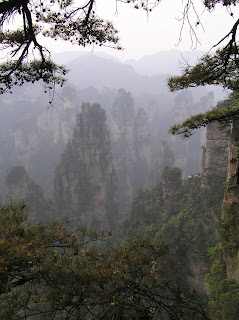 (long overdue summary of my travels during May 1st holiday)
(long overdue summary of my travels during May 1st holiday)Established in 1982 as the first national park in China, Zhangjiajie is often compared in importance to the establishment of Yellowstone in the US. Mist-wreathed crags of uplifted quartzite claw the skies above subtropical forests yet inhabited by some of the rarest and most endangered species in China--the pangolin and cloud leopard, for example.
Far more in evidence, in many parts of this park, is the common species: touristas horribilas Sinensis. In utter banality, these people flock to certain designated "must see" spots... and then proceed to ignore the wondrous natural phenomena all about them in favor of taking pictures--of themselves, and only of themselves. At the lookout point on Mount Tianzi, for example, I sat in the midst of their bustling activity... not ten feet from the edge of a thousand foot drop and needless to say gorgeous view. Group after group came to the edge, turned their backs to the needle-peaks behind them, and posed for the camera. After their chance to authenticate the trip for viewers back home had expired, they immediately lost any interest in the lookout point. The noise was incredible--one favorite activity was hooting at distant cliff faces in order to hear an echo.
Luckily, Zhangjiajie National Park, has something for everyone. The presence of a few well-defined scenic spots within the park that are easily reached by bus, elevator, and cable car, means that most tourists are rushed through a relatively small portion of the park with the ease of diarrhea through a slick bowel. Conversely, for the hiker willing to try something a little more strenuous, and to plot a course into the depths of the mountainous defiles, all the noise and ruckus can be left behind.
Day 1: I awakened to the sound of hotel doors slamming; the race to get into the park before the manifold hordes had begun. I was a bit tired, considering that I had flown into Hunan the night before and only found a place to sleep well after midnight.
Just inside the entrance of the park, I found myself in the midst of the tourists, taking the cable-way as an easy route to the top of the flat-topped mountain where the Huangshi village once stood. My estimation was that cherry-picking this spot in the early morning made the most sense, as it would only grow more crowded as the day went on. Why not?
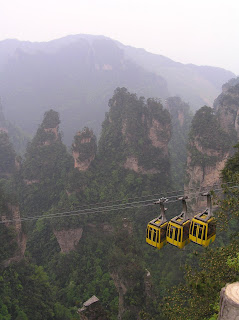 I chose a route going clockwise around the edge of the mountain; fortunately this proved to be the less popular route for the tour groups. The path I walked, and the chasm beside it, were quiet except for the calls of wild birds echoing across the gulf.
I chose a route going clockwise around the edge of the mountain; fortunately this proved to be the less popular route for the tour groups. The path I walked, and the chasm beside it, were quiet except for the calls of wild birds echoing across the gulf.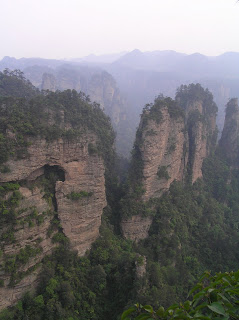
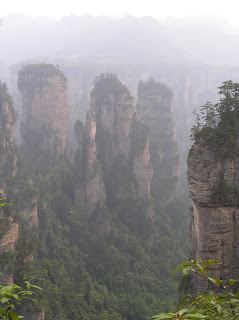
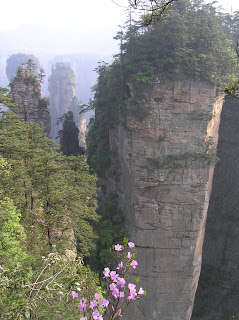 I won't bother to repeat all the myriad names the park has given to the various pinnacles and vistas... one gets tired of 'fairy' this and 'monkey general' that after a few minutes. An hour and a half took me around the rim of the mountain. Another half an hour allowed me to scramble down a stairway into the surrounding valleys... through the predictable horde of tourists. Onwards, I searched for a route less traveled.
I won't bother to repeat all the myriad names the park has given to the various pinnacles and vistas... one gets tired of 'fairy' this and 'monkey general' that after a few minutes. An hour and a half took me around the rim of the mountain. Another half an hour allowed me to scramble down a stairway into the surrounding valleys... through the predictable horde of tourists. Onwards, I searched for a route less traveled.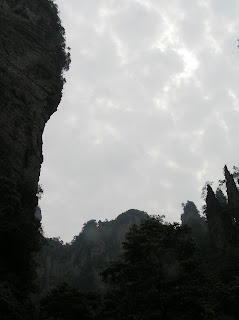 A pleasant path bumbled along the banks of a boulder-strewn creek. I noticed that the path was paved with limestone slabs containing the odd fossil ammonite. If the builders had known the value of such things, perhaps they would have chiseled these specimens out. The air was laden with healthful ions as advertised by a park sign. Monkeys hooted in the trees and tourists hooted back at them from the path below. Seeing food being thrown to the simians, it wasn't hard to understand why monkeys might congregate along the more touristed routes. I predicted that I might very well be witness to a monkey-bite by the end of my three day stay in the park.
A pleasant path bumbled along the banks of a boulder-strewn creek. I noticed that the path was paved with limestone slabs containing the odd fossil ammonite. If the builders had known the value of such things, perhaps they would have chiseled these specimens out. The air was laden with healthful ions as advertised by a park sign. Monkeys hooted in the trees and tourists hooted back at them from the path below. Seeing food being thrown to the simians, it wasn't hard to understand why monkeys might congregate along the more touristed routes. I predicted that I might very well be witness to a monkey-bite by the end of my three day stay in the park.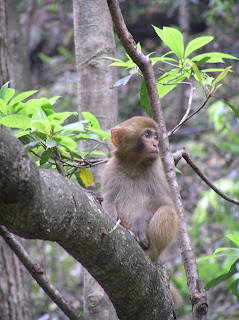 Stopping at the base of a gorge to sketch the jagged walls and their encrustation of greenery turned out to be a bit of a mistake. All who passed by wished to disturb this strange artistic foreigner. Much like monkeys, foreigners are a sight not to be missed or left in peace. I began to predict that monkeys wouldn't be the only ones taking a bite out of the tourists.
Stopping at the base of a gorge to sketch the jagged walls and their encrustation of greenery turned out to be a bit of a mistake. All who passed by wished to disturb this strange artistic foreigner. Much like monkeys, foreigners are a sight not to be missed or left in peace. I began to predict that monkeys wouldn't be the only ones taking a bite out of the tourists.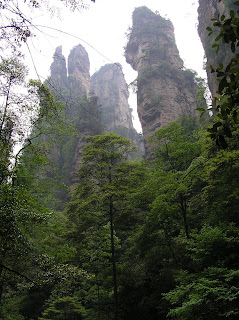
Tuesday, May 13, 2008
When the Earth Moves
Yesterday afternoon, Cherry and I were in the ancient port neighborhood of Ciqikou, following up leads for a magazine article I will write. Just as we stopped to check out an old imperial school turned into a teahouse, we suddenly felt dizzy. Or at least that's what I thought the problem was... at first. Similar to the feeling of a drunken stupor or vertigo, my brain seemed convinced that the earth beneath my feet was weaving back and forth. Then, as we watched a look of sheer horror spread across the faces of the Chinese tourists all around us, I began to realize that this might be a more serious problem:
The earth was moving beneath my feet.
The tourists began to surge back up the narrow, ancient alleyway that leads into the depths of Ciqikou (Tse-chee-koh) town. I pulled Cherry and myself under the dilapidated eaves of the imperial school. In China, the veneer of the past is much less dangerous than the mobs of the over-populated present. Despite that sickly feeling of vertigo that came and went for about five minutes, I didn't feel particularly endangered. I figured that although typical Chinese construction methods of the past sixty years or so are notoriously shoddy, at least we were under the relatively strong door frame of a sturdy old building, with only a thin tile roof above us. Rescuers would have little debris to remove, should worst come to worst. My greatest worry at the time, however, was that since the earthquake seemed to be fairly mild, there might be a worse shock yet to come. It was only some fifteen minutes later that we began to hear the reports that Chongqing was hardly the epicenter of the event.
In the bamboo encrusted, panda-infested mountains at the edge of the Sichuan basin, 60 km west of the provincial capital of Chengdu which is itself a further four hours drive west of Chongqing, the 7.9 Richter scale earthquake shook apart some 80% of nearby buildings. I suspect the final tally of victims may rival that of the last great Chinese earthquake (Tanshan 1976, hundreds of thousands died then). I suppose the only ameliorating circumstance is that the earthquake certainly could have hit much more populous parts of China, even within this region.
In any case, I won't repeat the facts, figures, and human interest stories which are doubtlessly flooding the airwaves. All of my friends seem to be safe, although I haven't heard back yet from the manager of Mianyang Aston English School, located in the eponymous city which has seen more than 3,000 dead and 18,000 lost underneath debris.
As for myself, I still reside on the nineteenth floor of a condo tower of somewhat dubious building standards (the pipe under our kitchen sink broke a week or two ago, flooding our entire apartment to a depth of 3 cm or so). The Chinese co-manager of my school stopped by this morning to breathlessly tell me to spend as much time as possible outside of my apartment, to watch CCTV 9 (China's only English-language channel) for updates, to keep an eye on the people outside to see if they run into the streets, and inform me that school will be closed today and tomorrow due to the earthquake.
Fair enough, I say. Chongqing doesn't get snow days.
A predictable bit of an overreaction from the Astonian powers that be. They hardly wish to deal with the anguish and lawyers of teachers and children trapped within school premises--should aftershocks collapse already weakened structures. But I questioned the wisdom of Walter's other commandments. For one thing, if an earthquake hits and people flood into the streets visible to my sky perch, it's probably a little late for me to attempt the climb down nineteen flights of stairs. Let us not even contemplate the absurdity of waiting for concurrent news from CCTV's sorry excuse for an English-language news channel.
I do prefer to think that neither rain, nor snow, nor earthquakes, nor extraterrestrial demons could deter us teachers from our sacred duty to impart English--and stimulating thought exercises--upon our students. Chongqing was spared the wrath of god (or gods), and clearly this is a sign that Chongqing locals have better karma than do citizens of nearby Sichuan province. We should keep on doing what we do best, in the city of spice; we should continue our laborious march into the infernal heat of summer.
I wonder: Do the leaders of the CCP, like me, also recall an ancient Chinese tradition called the "mandate of heaven", portending the end of dynasties? Do they ask themselves if the Olympics are being held in vain, in the face of snowstorms, riots, protests, counter-protests, outbreaks of pestilence, typhoons, and earthquakes of epic scale... all within the last three months? I also wonder what is in store for the next three months.
The earth was moving beneath my feet.
The tourists began to surge back up the narrow, ancient alleyway that leads into the depths of Ciqikou (Tse-chee-koh) town. I pulled Cherry and myself under the dilapidated eaves of the imperial school. In China, the veneer of the past is much less dangerous than the mobs of the over-populated present. Despite that sickly feeling of vertigo that came and went for about five minutes, I didn't feel particularly endangered. I figured that although typical Chinese construction methods of the past sixty years or so are notoriously shoddy, at least we were under the relatively strong door frame of a sturdy old building, with only a thin tile roof above us. Rescuers would have little debris to remove, should worst come to worst. My greatest worry at the time, however, was that since the earthquake seemed to be fairly mild, there might be a worse shock yet to come. It was only some fifteen minutes later that we began to hear the reports that Chongqing was hardly the epicenter of the event.
In the bamboo encrusted, panda-infested mountains at the edge of the Sichuan basin, 60 km west of the provincial capital of Chengdu which is itself a further four hours drive west of Chongqing, the 7.9 Richter scale earthquake shook apart some 80% of nearby buildings. I suspect the final tally of victims may rival that of the last great Chinese earthquake (Tanshan 1976, hundreds of thousands died then). I suppose the only ameliorating circumstance is that the earthquake certainly could have hit much more populous parts of China, even within this region.
In any case, I won't repeat the facts, figures, and human interest stories which are doubtlessly flooding the airwaves. All of my friends seem to be safe, although I haven't heard back yet from the manager of Mianyang Aston English School, located in the eponymous city which has seen more than 3,000 dead and 18,000 lost underneath debris.
As for myself, I still reside on the nineteenth floor of a condo tower of somewhat dubious building standards (the pipe under our kitchen sink broke a week or two ago, flooding our entire apartment to a depth of 3 cm or so). The Chinese co-manager of my school stopped by this morning to breathlessly tell me to spend as much time as possible outside of my apartment, to watch CCTV 9 (China's only English-language channel) for updates, to keep an eye on the people outside to see if they run into the streets, and inform me that school will be closed today and tomorrow due to the earthquake.
Fair enough, I say. Chongqing doesn't get snow days.
A predictable bit of an overreaction from the Astonian powers that be. They hardly wish to deal with the anguish and lawyers of teachers and children trapped within school premises--should aftershocks collapse already weakened structures. But I questioned the wisdom of Walter's other commandments. For one thing, if an earthquake hits and people flood into the streets visible to my sky perch, it's probably a little late for me to attempt the climb down nineteen flights of stairs. Let us not even contemplate the absurdity of waiting for concurrent news from CCTV's sorry excuse for an English-language news channel.
I do prefer to think that neither rain, nor snow, nor earthquakes, nor extraterrestrial demons could deter us teachers from our sacred duty to impart English--and stimulating thought exercises--upon our students. Chongqing was spared the wrath of god (or gods), and clearly this is a sign that Chongqing locals have better karma than do citizens of nearby Sichuan province. We should keep on doing what we do best, in the city of spice; we should continue our laborious march into the infernal heat of summer.
I wonder: Do the leaders of the CCP, like me, also recall an ancient Chinese tradition called the "mandate of heaven", portending the end of dynasties? Do they ask themselves if the Olympics are being held in vain, in the face of snowstorms, riots, protests, counter-protests, outbreaks of pestilence, typhoons, and earthquakes of epic scale... all within the last three months? I also wonder what is in store for the next three months.
Subscribe to:
Posts (Atom)

